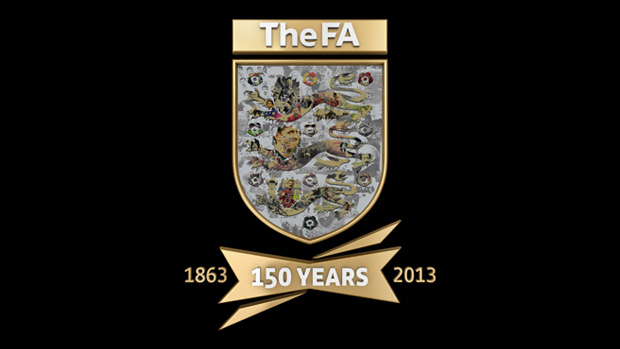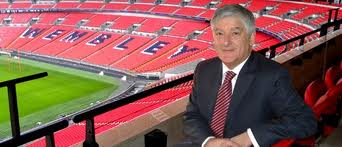The 150th anniversary of the Football Association certainly deserves to be celebrated. Any organisation that has reached such a venerable age has the right to celebrate its birthday and no doubt get a telegram from the Queen, or however Her Majesty marks such occasions these days.
But the tipple for the occasion should not be Krug champagne but a glass of Prosecco. For all the warm words that are now being showered on the FA from far and wide the best thing that can be said about the FA is that it still exists. But then so does Lloyds of London, an older institution than the FA let it be recorded. But not many would think of raising a glass to that organisation.
I would not go quite as far as Hugh Robertson, the British sports minister, did sometime ago when he condemned football as the worst governed sport in this country. Now would I compare the FA to the British Civil Service about which there has been much recent talk that it is not fit for
purpose. Indeed much is being made of the fact that the famed Whitehall machinery far from being a Rolls Royce is more like a tank, impossible to manoeuvre.

The FA reminds me of a vehicle which I saw and heard much about when growing up in India: the bullock cart. Like the bullock cart, still to be seen in the Indian villages and in many a Bollywood movie, the FA, even when it manages to take you from A to B, only succeeds in emphasising its age and revealing it has no great purpose.
The present mandarins of the FA cannot be held responsible for the historic mistakes of the organisation. But since in the next few months the FA will bask in the glory of organising the beautiful game and inventing its laws it is worth noting that it played little or no part in helping make it the most popular game in the world.
That task fell to the French who organised FIFA and had to do so in the teeth of opposition from the then FA mandarins. Sir David Richards, the Premier League chairman was not far wrong when he, in effect, condemned the FA for this failure. If his choice of words, blaming the foreigners for “stealing” the game from England, was unfortunate, the fact was the FA allowed the foreigners to take something England had created. Indeed for the first hundred or so years of its existence the FA considered globalisation such a foreign concept that until the Second World War for many years it even refused to belong to FIFA. And it totally ignored the first three World Cups.
The effect of this lack of vision has been very evident during the current India-England one-day cricket series. English commentators appear to gasp in wonder when they discover how popular football is in India. They assume that this reflects the global popularity of the Premier League. But Indian love for football long predates the creation of the League. It goes back to when the FA was still in its infancy. Then such was the lure this English game created in India that the country can boast it has the second oldest football competition in the world.
Indeed as the FA celebrates its 150 birthday Indians are celebrating the 150 birthday of the great Indian Swami Vivekananda. He was bitten by the football bug and advised Indians that they would get closer to god if they learnt to play football. Given such endorsement for the game in that country more than a century ago can you imagine what might have happened had the FA not been so insular?
The FA could say this historic failure has been more than compensated by the success of the Premier League, arguably the most successful brand this country has created in the last half century. But even here the FA has missed the boat. True, without its approval the top boys of the old First Division could never have broken away from the old Football League but the FA’s purpose was to help produce a winning England team. We all know how far the FA has succeeded in that project.
This failure stems from a fundamental flaw in the very thinking of the FA. It is one that has been well highlighted by Gordon Taylor, chief executive of the Professional Footballers Association. This is that, for all the organisation’s claim to run the game in this country, it has never been the game’s regulator. Indeed it has never aspired to such a position. This explains why the Premier League, a child of the FA, is now a more powerful worldwide body than the father.
And there is no sign that the 150th birthday celebration is making the FA rethink this historic reluctance to take charge of the reigns. Take for instance the so called clarion call David Bernstein the FA chairman (pictured below) has sounded. This is to promote the mantra of respect, responsibility and
accountability.
Now these are sentiments nobody could quarrel with. But what is the FA’s role in this? Very clearly it is to follow not to lead. If you doubt that, then read Bernstein’s column in the Sun today. It is not often that a man in a suit heading a sports organisation gets to write on the main editorial page of England’s most popular tabloid newspaper.
However what makes the column really revealing is to see how defensive the 150 year old FA is about the national game. It is summed up in the headline: “Olympics gave footie a kick up the backside.” Bernstein devotes a lot of time reminding us how wonderful 2012 Olympics was and how it showed football how both athletes and fans can enjoy competitive sport and still behave with honour and dignity.
Bernstein does praise football fans and is very proud of the fact that matches in this country attract away fans. He is particularly taken by the fact that FA Cup match between West Ham and Manchester United saw 6,000 United fans travel to Upton Park. But this is where Bernstein, a very
honourable man, reveals a failure to lead. For he talks of the “wonderful tribalism” of English fans. But that word tribalism disguises the fact fans in football are segregated. I am well aware of why such segregation came about, a legacy of the dark days of the 70s and 80s when watching football was like going to war.

However the fact that in the 21st century football imposes an obligation no other sport does shows how far the game still has to go. Observe you can go to any other sporting match and watch it sitting next to person who supports an opposing team, even an India Pakistan cricket match as I have done in this country. For Bernstein to describe it as “wonderful tribalism” is a cop out. It shows a sad lack of willingness to tackle what would have been an ideal campaigning objective for the 150th birthday celebration: let us bring back the days when fans could go and sit where they wanted irrespective of the team they supported.
But if that is too big a task for Bernstein and his FA how about taking on the challenge thrown down by Simon Clegg, chief executive of Ipswich? He would like the FA to persuade the government to remove the ban on drinking. This means that you cannot watch a match with a pint in your hand. The alcohol ban, like seating segregation , resulted from football hooliganism of the 80s and it means English football has created a very upstairs, downstairs, almost Downton Abbey world. So people in corporate boxes , as at Wembley, can drink as much as they like. However 15 minutes before kick off the blinds are drawn making sure there is no drinking in sight of the pitch.
Clegg wrote to Bernstein back in October but, apart from an acknowledgement, there has been no response. Now Clegg is no novice. He knows a thing or two about taking on seemingly impossible missions. As chief executive of the British Olympic Association he played a vital part in London launching the 2012 bid, at a time when few thought Britain stood a chance. And he was at Singapore when London surprised Paris. However, for Clegg to succeed now it requires the FA to give the lead and would that not be a great campaign for a 150 year old?
But there is little sign of the 150 year old being persuaded. And that shows that for all the kudos the FA will receive over the next few month it is still stuck in the bullock cart age. Somebody should tell the FA that even much of India has moved from bullock cart to the tuck tuck. However, for that to happen at Wembley you would require not champagne but a bazooka to start a revolution. And that is very unlikely.
Mihir Bose’s latest book: Game Changer How the English Premier League Came to Dominate the World has been published by Marshall Cavendish for £14.99
Follow Mihir on twitter @mihirbose

